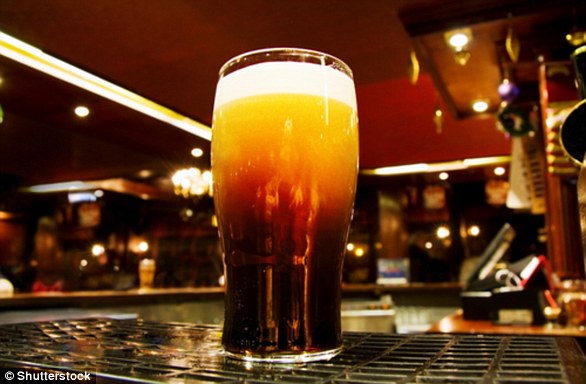When Olivia Rodrigo was pictured wearing a shirt proclaiming ‘Guinness is good 4 u’ at her concert in Dublin last week, it felt like the world had been caught in a time warp.
The phrase, which was an advertising slogan for Ireland’s most famous drink as early as the 1920s before being banned in the 1960s, is a sign of the current attitude towards the stout among Generation Z.
Whisper it quietly, but Guinness, once the reserve of elderly men and boozing rugby lads, has become trendy with the black and white ale finding a new popularity among the younger generation.
Celebrities such as Rodrigo, Kim Kardashian and even the Princess of Wales have shared pictures of themselves gulping down glasses of the easy-on-the-eye Irish export on social media.
The beverage has become the subject of thousands of videos on TikTok, with people sharing their search to find the perfect pint – as well as their anguish when they receive a disappointing pour.
The practice, which one could imagine is better than any marketing campaign Guinness’s owners Diageo could come up with, has become akin to an extreme sport for many youngsters.
Combined with the suggestively named and confusingly vague ‘Splitting the G’ challenge, which has run riot in some quarters online in recent years, it seems Guinness has become the drink of choice for the social media generation.




The rich and famous don’t seem to be immune to the frenzy surrounding the drink.
Less than a week after performing in Dublin with a ‘Guinness is good 4 u’ shirt, Olivia Rodrigo shared an image of herself sipping on a pint of the black stuff from a British pub.
In doing so she joined Kim Kardashian in the ever-growing list of people from across the pond who have succumbed to its appeal.
Reality star Kardashian had shocked locals at a London watering hole after turning up for a boozy St Patrick’s Day pub crawl in March last year, and was seen cradling pints of Guinness and downing shots of ‘baby Guinness’, which is made with coffee liqueur and Irish cream.
Even without trying the stout sometimes turns up on people’s TV screens – in one episode of hit Netflix show Selling the OC, British expat Polly was seen nursing a pint of Guinness.
The drink seems to have developed a rare appeal across almost all sections of society – even teetotallers can get in on the action with an alcohol-free version – as has been seen by Kate Middleton’s love of the ale.
The Princess of Wales has been spotted with a Guinness in hand on numerous occasions, including on a visit to Ireland in 2020 and on St Patrick’s Day in 2017 where she swigged a glass with Prince William.
As well as the famous faces, Generation Z has also been swept along in Guinness fever.



It has seen a rise of dedicated accounts across different social media platforms putting collages and videos together of the most photogenic pints of Guinness across the land.
Shacked up in the pubs of Britain, these punters pour over every detail of their pint, noting how creamy the foam is, how much of it they’ve been given and whether the server adhered to the famous ‘two-part part’ pour.
One of the ways TikTokers do this is using the ’tilt test’ – where drinkers tilt their pint at a 45-degree angle to see how creamy the Guinness is.
The idea is that if it it is up to standard, the contents of the drink will not spill out from the top of the glass despite being at an angle.
One other such method judgement used is the quantity of so-called ‘shtick’ – a phrase popularised by content creator Darragh Curran, formerly known as The Guinness Guru.
Drinkers say that a superior pint will have more ‘shtick’ coated to the glass after a pint has been finished, showcasing a smoothness and, supposedly, a superior taste.
While actually downing pint, punters might sometimes feel compelled to take part in the ‘Splitting the G’ challenge.
It’s a viral contest that sounds simple enough – drink your pint and stop until the dividing line between the ale and the cream reaches the right spot, with no pauses or tilts to check your progress.
But the confusion comes from where you’re actually supposed to stop drinking – some claim it should be when the line reaches the middle of the ‘G’ in the word Guinness, others that the line should be between the top of the word and the bottom of the iconic harp logo on the pint glass.
However, the quality of the pint might have some impact on the results, and it seems hell hath no fury like a Guinness drinker scorned, because those who are disappointed by the results will post their honest opinions online, often filled with scorn.
The practice of rating these pints has become so widespread that there are even dedicated accounts which talk about nothing but the Irish ale.
One of these, called S*** London Guinness, posts nothing but photos of what are seen as bad pints of the stout.
Whether it be Guinness that has too much cream or too little, a glass that has been overfilled or underfilled, or where its iconic black colour is lacking, people have no compunction about naming and shaming places they think have erred when it comes to their pour.
Despite the tame efforts of some pubs, there appears to be no sign of the Guinness juggernaut slowing down.


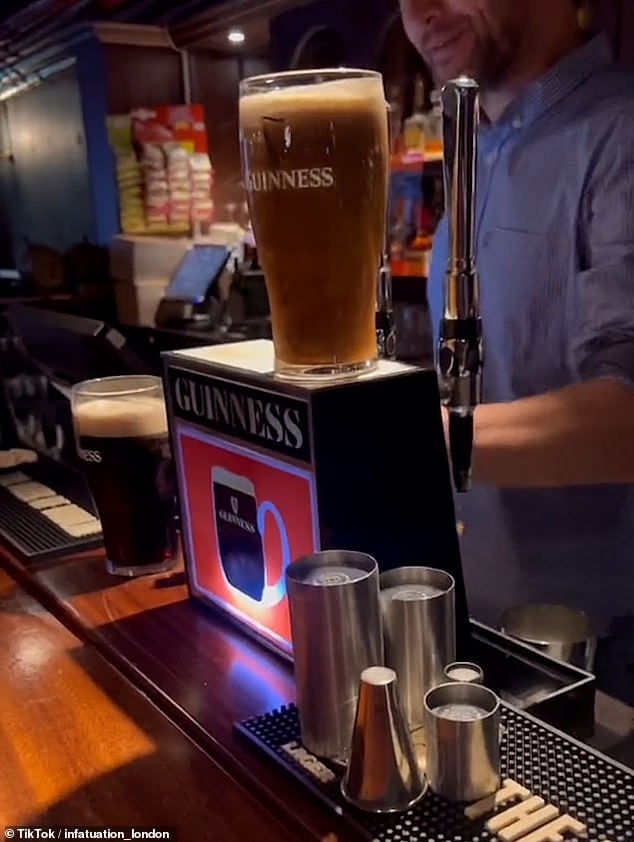
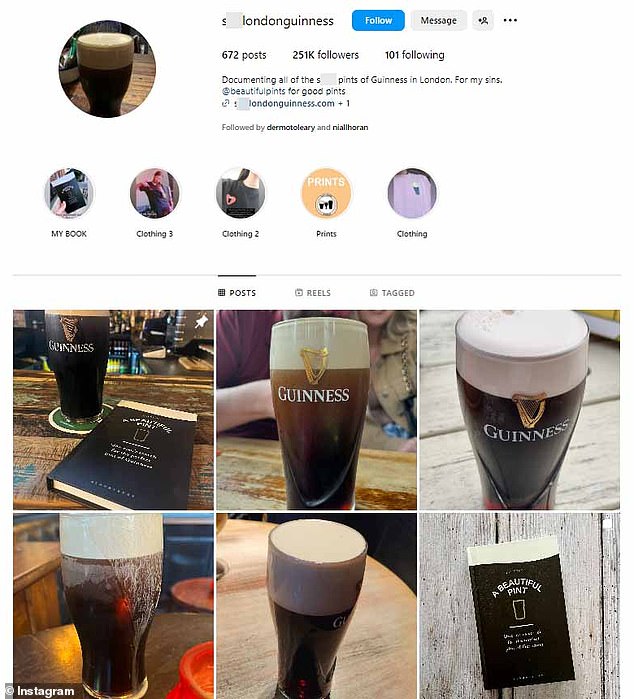
Diageo says the endorsements from Kim Kardashian and the Princess of Wales have seen a 24 per cent rise in the number of female Guinness drinkers in the UK.
Debra Crew, the firm’s CEO, said earlier this year: ‘You see people like Kim Kardashian all of a sudden drinking Guinness when she’s in London, or Kate Middleton – these things catch on.’
However, she added that ‘rugby lads still like it’ while it also appeals to ‘hipster’ types.
‘There is this hipster element as well, I think anytime you touch something in culture, it does just spread,’ Ms Crew told The Telegraph.
‘Some of the craft almost got too crafty, in a way. And so it maybe felt a little overdone, whereas Guinness feels more straightforward. It’s really resonating with people versus this fruity craft beer or whatever.’
The phrase ‘Guinness is good for you’ was an advertising slogan drawn up by the firm in 1920s, playing on the fact that customers told researchers they felt better after drinking the pint and thought it was good for them.
The slogan was banned in the 1960s over claims it was false advertising, but pubs these days would have a similar sentiment towards the drink given as it pushes up their sales.
In 2022 Guinness was the best-selling beer in pubs, bars and restaurants according to hospitality data company CGA.
JD Wetherspoon has said soaring demand for Guinness from younger punters and recovering demand for ale helped the UK pub chain to higher sales over past three months.
The company’s founder and chairman Tim Martin remarked: ‘The gods of fashion have smiled upon Guinness, previously consumed by blokes my age, but now widely adopted by younger generations.’

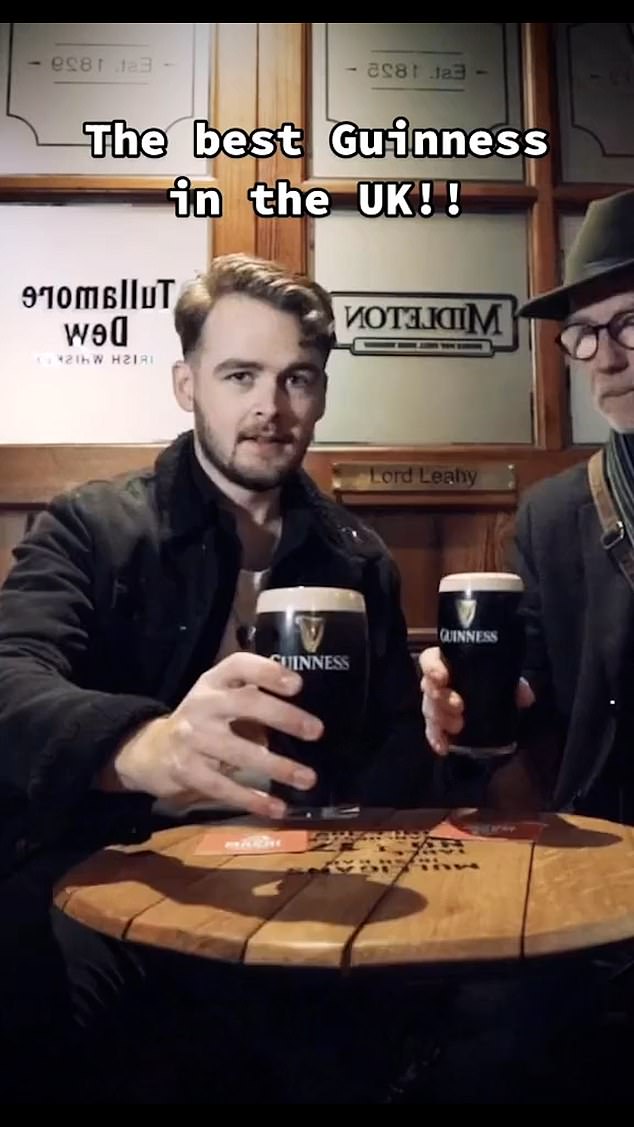
However, the search for the perfect pour, and the very public shaming of some pubs for getting it wrong in the eyes of viewers does niggle in the back of Ms Crew’s mind – particularly when it comes from from S*** Guinness London account.
She said: ‘We do monitor it and we get out there and try to help people make sure that doesn’t happen.’
But how do you pour the perfect pint in the first place? It turns out the matter is subject of some debate.
According to Guinness, a draught pint should be poured in 119.5 seconds in two stages – but whether this is effective or not is a common dispute among drinkers of the stout.
Professor William Lee at the University of Huddersfield suggested pouring draught could be a much faster process that is currently ‘as much about marketing as it is the physics’.
He explained: ‘It has become a time-honoured ritual in pubs around the world. A bulk of that time is the settling. But this time period is as much about marketing as it is the physics. You may be waiting longer than you would for another beer, but that’s by design.’
Bubbles in Guinness are filled with nitrogen, he explained, while most beers are carbonated using carbon dioxide.
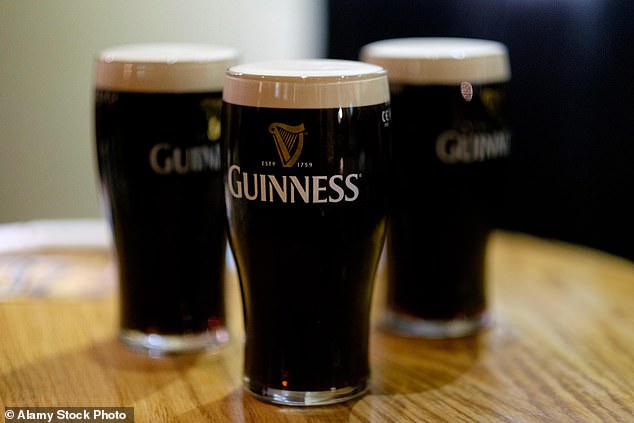
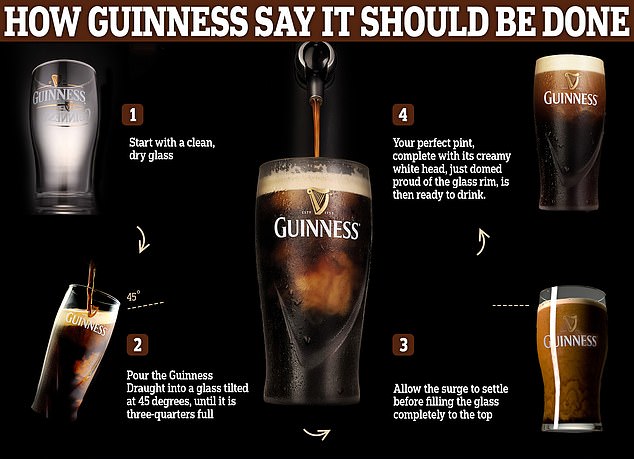
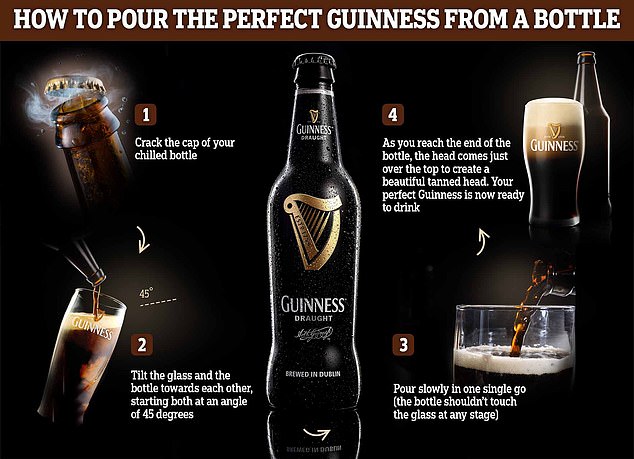
Unusually, the bubbles in Guinness pint also sink rather than rise which he claims is due to the shape of the glass walls that push them downwards.
‘As it sinks it carries the bubbles with it. So that’s why you see the sinking bubbles in Guinness with the small bubbles, which get carried down by the currents,’ he added.
In advice that will fill many Guinness lovers with dread, Professor Lee actually recommends drinking the beverage from a giant cocktail glass.
In a video for Tech Insider in 2018, he said: ‘Every Guinness is supposed to be poured into a specially crafted tulip glass. But that glass is designed to manipulate the bubbles in the beer to turn the pour into a performance, making you wait longer than you need to.’
In response, Anna MacDonald, Category Marketing Director Beer at Diageo GB said: ‘A beautiful, great tasting pint of Guinness Draught is served using our famous ‘two-part’ pour.
‘First, pour the Guinness Draught into a clean, dry Guinness pint glass tilted at 45 degrees, until it is three-quarters full.
‘Now, it’s time to wait! Allow the surge to settle before filling the glass completely to the top, creating the perfect pint!’
Another individual who disputes the method of a two-stage pour is Nate Brown, owner of Paloma Café, Soda & Friends and Nebula cocktail bars in London.
He dismissed the practice in an article entitled ‘there’s no such thing as the perfect Guinness pour’.
‘This isn’t done for the beer’s sake; it was practice in the Guinness brewery to speed up serving the masses at home time – the brand has always had the savviest of marketing departments,’ he wrote in FT Magazine.
Oisín Rogers, co-owner of The Devonshire in Soho, described Mr Brown’s assertion as ‘absolute horses***’.
He tweeted: ‘It’s impossible to get a correctly presented pint of Guinness in one pour because the meniscus is negative.
‘Therefore a dimple rather than a dome. Also he’d texture completely disappointing leading to a far inferior drink. There.’
David Lace, an Irishman living in the UK, agreed, stating: ‘Not true, has to be in 2 stages, too many times it’s been poured terribly in one go’.
A Diageo spokesman told MailOnline in response to Mr Brown’s comments: ‘This is not the case.
‘In order to get the right consistency in the head, get the right head height, and the dome over the top of the glass perfectly, you need to pour in two stages.’
